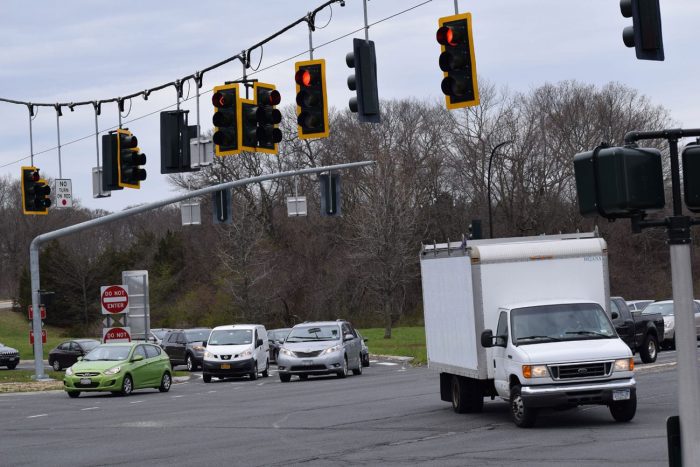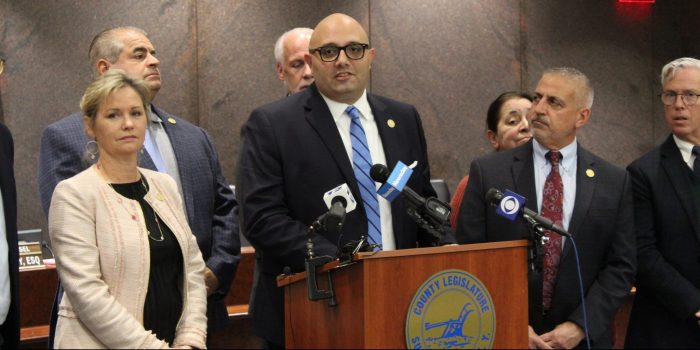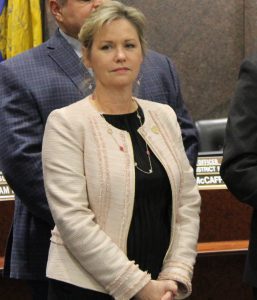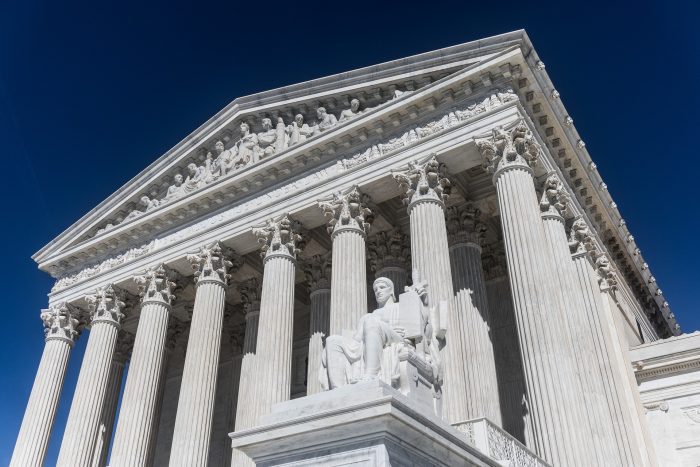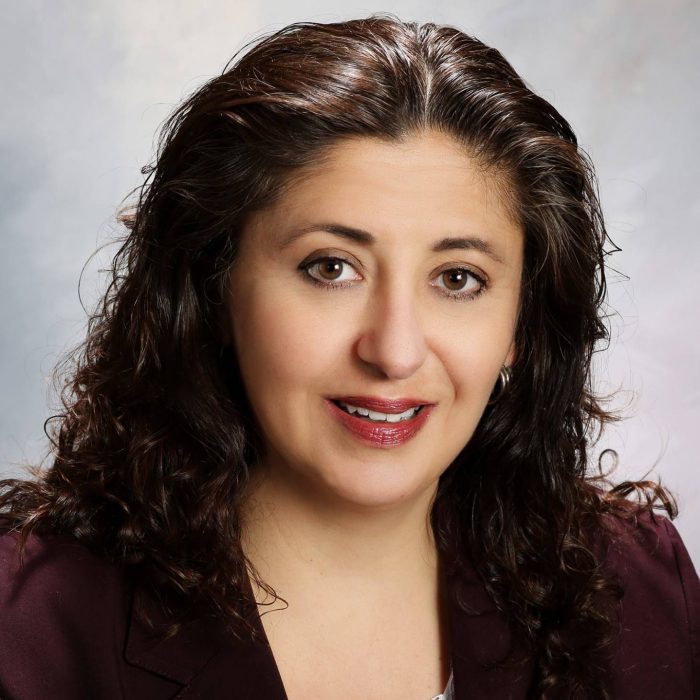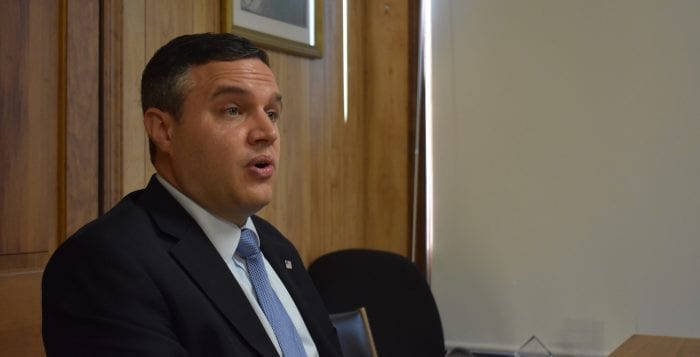In a year of narrow margins of victory and slim majorities in the U.S. House and Senate, Republicans made steady gains in Suffolk County. Following this outcome, TBR News Media spoke independently with Rich Schaffer and Jesse Garcia, respective chairmen of the Suffolk Democratic and Republican committees, for their views on the local outcome.
What is your initial reaction to this year’s midterm election results?
Schaffer:
In Suffolk County, I think voters were clear in demonstrating that they had great concerns about some of the issues out of Albany, issues revolving around public safety, law enforcement and affordability. I think [Republican gubernatorial nominee U.S. Rep.] Lee Zeldin [R-NY1] spoke to that, and that’s why you had the results you had where I think he gathered about 59% of the [Suffolk] vote.
We, the Democratic Party, need to do a better job on messaging. The governor [Kathy Hochul (D)] delivered record amounts of state aid for education, and nobody even knew about it. The governor delivered record amounts of infrastructure monies that fixed the LIE and various roads throughout the county, and nobody knew about it. The governor held up the state budget to have tweaks made to the bail reform and criminal justice issues that were passed by the Legislature earlier this year, and nobody knew about it.
I think we failed at our messaging, and the Republicans did a better job on that.
Garcia:
I’m very proud of the reaction of the voters of Suffolk County and of the hard work of the Suffolk County Republican Committee members involved here. This is a process that began in the cold, wintery nights of February. It culminated with the night we call our Super Bowl, with a successful election night.
Our goal was to deliver 60% of the vote for Lee Zeldin. We did, we gave him a plurality of 100,000 votes. I couldn’t be more proud of the efforts we put in in Suffolk County, Long Island and throughout the state. Because of our efforts, we knocked off a 40-year Democratic incumbent lawmaker [state Assemblyman Steve Englebright, previously a Suffolk County legislator (Setauket)] and we came very close in two other seats, AD-11 and the 4th Senatorial District.
All in all, it was a very successful night. More importantly, it was a successful night for the voters of Suffolk County.
Did your party meet expectations?
Schaffer:
I can’t speak to the county numbers because I don’t have all of them, but I’ve been looking at the Babylon numbers because I’m an elected official in Babylon.
We underperformed in terms of turnout. Republicans had their normal turnout in Babylon. Blanks [i.e., those not registered with any party] and Democrats had about 10% to 15% less turnout than we would normally have in a gubernatorial election year. That alone speaks to my answer to the first question, messaging. And two, in terms of turning out people who would normally turn out for us, we didn’t do a good job doing that. We have to find out why they didn’t turn out.
Garcia:
We always set very lofty goals for ourselves. In my time as chairman of the Republican Party here in Suffolk County, in every election cycle we have flipped a blue seat. I have great confidence in this committee. When we set our minds to a goal, we meet them. On Nov. 9 and 10, we were in our headquarters plotting out the next election cycle and setting goals there for our town and our county.
Based on these results, how is voting behavior in Suffolk County changing?
Schaffer:
I don’t know if it’s changing, but I would say that it’s always going to be a moderate to conservative place. The enrollment numbers are pretty much even, Democrat to Republican, and then there’s another third who are independent, blanks.
You are seeing ticket splitting because Democrats are getting elected in various places. If there’s an answer to your question about changing, I would say that Suffolk County voters are voting in a more moderate to conservative way, whether they be a registered Democrat, Republican or not registered with any party. And maybe that’s to say that registration doesn’t determine how someone’s going to vote.
I think they’re going to come out and they’re going to vote based on how they feel about the particular issues of the day, and if you haven’t done your job on messaging then you’re not going to win that battle.
Garcia:
I think that it’s changing in a way that we are utilizing Republican governance as the proper way to govern at the town level, the county level, or the state and federal levels. I use our supervisors throughout the town, our Republican supervisors with Republican majorities, to show the voters that there’s a different way to govern, and I think that way is now being responded to.
Even deep blue seats in the strongholds of the Democratic Party — whether it be Babylon Town or in the 1st [Council] District of Brookhaven — we have had historic victories this year. While we’ve had successes at the townwide level, this year we finally broke through that ceiling and were successful at the [state] level by defeating Assemblyman Englebright.
I believe that the voter trends that we’re seeing are the results of the political infrastructure, on one hand. On the other hand, residents are recognizing the difference between Republican and Democratic governance.
Has your party altered its political strategy with respect to voting by mail? Do you foresee mail-in ballots playing a greater role in the future?
Schaffer:
Absolutely. I think any time you make voting more accessible, you’re going to get a better response from people. We were always champions of communicating with people who are on permanent absentee [ballot status], those who are in nursing homes or who are not able to get out and vote physically.
Keep in mind, if someone requests a ballot early, or with early voting as much as 10 days out, you have to kind of move up your communications schedule so that you don’t lose the opportunity to communicate with those people and have an impact. If there’s a change in strategy, it’s probably moving up the communication schedule and doing it earlier.
Garcia:
I made a commitment to our leaders, to our candidates, our elected officials, our committee people and to the voters of Suffolk County that I will adapt.
I will make sure that this party has the wherewithal to adapt to any and all shenanigans on the electoral side set forth by the Democratic majority in Albany.
We continue to do that on an annual basis, and this year — unlike in previous years — the absentee ballots were not as disastrous.
As I said, I adapt each and every year our tactics, our approach and our strategies to any electoral shenanigans that the Democrats in Albany put into place.
What does your party have to do to win over more voters?
Schaffer:
More direct communication. I’ve told our party members that we have to get back to doing door-to-door. Obviously, COVID really knocked the you-know-what out of that. People have just given up on talking to people in an office, relying on text messages and emails. Mailings have kind of even dropped down now. It’s become who can get their message out on TikTok and Instagram.
I think people have become immune to that because they’re just pounded all day long with social media and technology, so I think we have to get back to more direct, one-on-one social interaction. The local election year next year, 2023, is a great year to do that because turnout does drop in ‘23 with a smaller group of people to communicate with.
I think it’s important to do that and to get the party people to do that, because that’s the best way to have an impact on getting your people out and getting people to buy into your message.
Garcia:
We’re going to continue doing what we’re doing. We’re going to expand and grow our coalitions. We’re going to learn from the successes we had in 2022. Those areas that we think we can improve upon, we will.
My goal right now is to reelect the incumbents in Brookhaven Town, in my capacity as Brookhaven Town [Republican Committee] chairman.
And then to set my sights on the county executive’s seat, filling it with a Republican for the first time in 20 years, and to expand and maintain the Republican majority elected last year [in the county Legislature].

